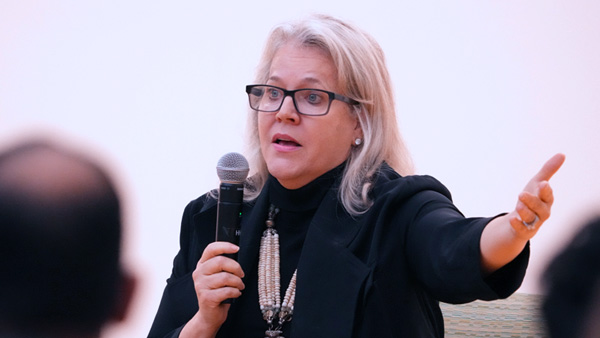On Monday, February 7, Plant City opens its fifth location in Bryant University’s Newport Hall, continuing a partnership that helps Bryant students eat healthy and learn more about the world around them. Aiming higher than simply preparing tasty plant-based food, Plant City’s mission is focused on health, sustainability, social justice, and giving back to the community — including the opportunities afforded to Bryant students.
“We are so excited to have Plant City X at Bryant," says Dr. Inge-Lise Ameer, Vice President of Student Affairs and Dean of Students. "It is a wonderful opportunity for our students to experience delicious, plant-based food options.”
For Plant City co-founder and Bryant University trustee Kim Anderson ’22H, the Bryant connections run deep. Her parents, Robert Sprague and Audrey (Perreault) Sprague, were both members of the Bryant College's Class of 1956 and her father-in-law, Charlie Collis, was a former Bryant trustee who received an honorary degree from Bryant College in 1983. Her mother also taught at Bryant for six years after graduation. In 2022, Anderson was awarded an honorary doctorate in business from Bryant for her efforts as an entrepreneur and business leader committed to building a better future.
Anderson’s work is her passion and she’s driven to share what she’s learned about healthy, sustainable, and ethical living and dining — and about the keys to running a successful business. A regular presence at Bryant, she has spoken at events including the university’s Day of Understanding and presented to university classes.
“I really love the interaction I have with Bryant students here because they’re so thoughtful and so engaged,” says Anderson. “I especially love being part of the Q-and-A sessions because they have so many great questions.”

She’s also helped to ensure Bryant students can find some of the answers on their own. Bill Robatzek ‘24, for instance, obtained first-hand experience when Plant City invited his Foundations of Marketing Management class to observe one of their restaurants and examine their marketing efforts — and even make suggestions the company could use going forward.
“Plant City welcomed us with open arms,” adds Robatzek, who says that learning about the ins-and-outs of an actual business was perfect preparation for his future career as a consultant and a chance to see how his studies can be applied in real life. “This is the sort of hands-on experience you need. I was able to talk to people and observe the restaurant and see how it all really works.”
He was especially impressed with Anderson’s involvement in the process. “She was really accessible, and it was kind of amazing to talk to a real CEO who would take the time to answer my questions,” he says. “Not many students have that opportunity.”
Anderson notes that the real-world experiential learning opportunities Bryant offers are a differentiator for students. “The experience students get gives them practice flexing that muscle of ‘outside the box’ thinking. Having that experience of hunkering down with a problem set and wrestling with it and coming up with real-world solutions is going to make a real difference for them.”
“It’s a real part of their mission and seeing how passionate they are about it helps to remind you that there’s so many things we can all do to support sustainability, and that there are organizations we can support to make an impact."
Bryant students are also learning how Plant City puts those problem-solving skills to work to address some of the world’s largest issues. Aimee Parenteau ’23 visited Plant City through her Corporate Social Responsibility in the Global Supply Chain course to learn more about the organization’s sustainability efforts. By choosing a plant-based meal over an animal-based meal, restaurant officials said, the company and patrons have saved 27,015,710 square feet of forest and 524,376,700 gallons of water. Plant City has also diverted 376 tons of trash from the local landfill by composting, they noted.
Parenteau, an officer in Bryant’s student-run SustainUS organization, which works to develop a more sustainable campus and to create social awareness about sustainability, came away from the visit inspired and she resolved to take some of the ideas from the Plant City model and institute them back on campus.
“Sustainability isn’t just something they talk about,” she notes. “It’s a real part of their mission and seeing how passionate they are about it helps to remind you that there’s so many things we can all do to support sustainability, and that there are organizations we can support to make an impact. This is something that people, especially people in my generation, are looking for.”
The fact that the food is good, she says, makes it even better. “I really liked their pizza and avocado toast,” says Parenteau. “I’m excited to eat there again.”
Adds Robatzek with a laugh, “I’ll be honest, at first I was a little bit skeptical. But when I tried the food and learned more about the community they’d built and what’s important to them, it definitely convinced me.”
Bryant University's Plant City location is open Monday–Friday: 11 am–6 pm